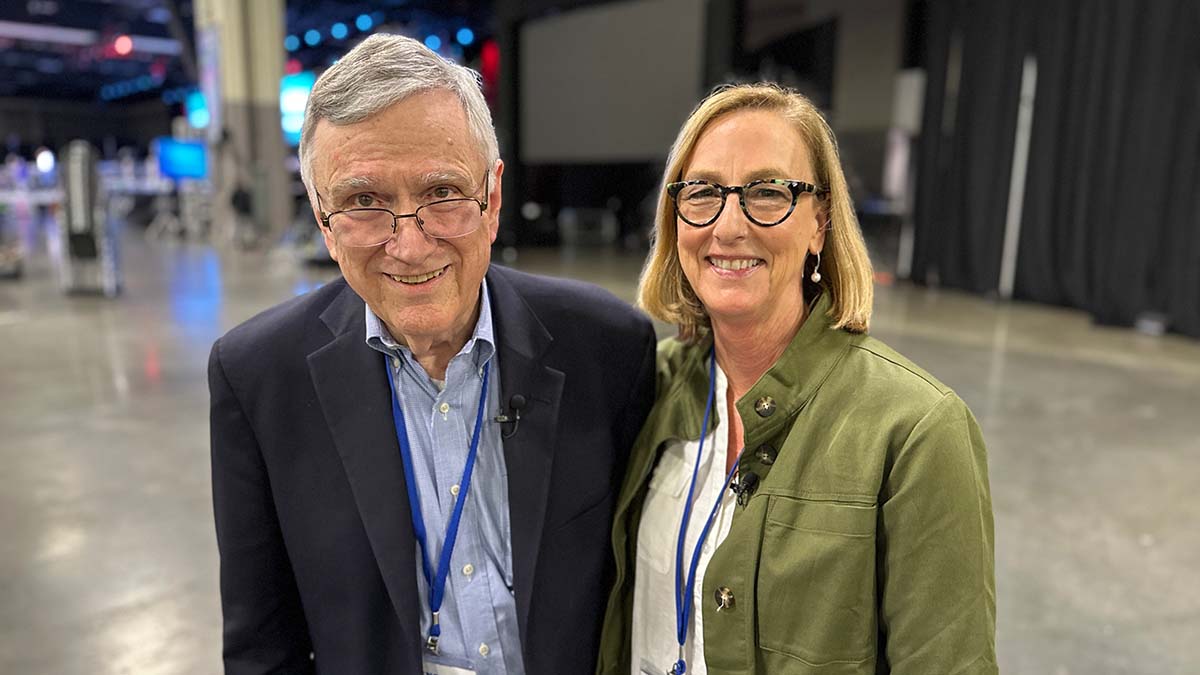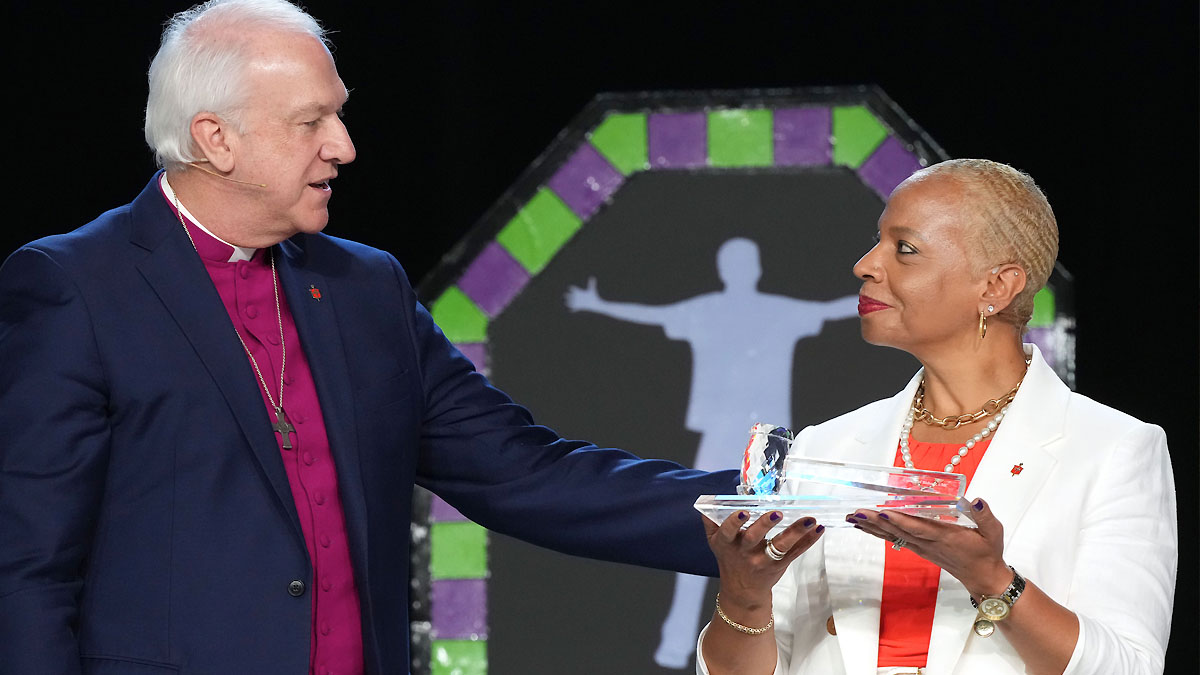
General Conference
The upcoming session of General Conference will be held at the Charlotte Convention Center April 23 – May 3, 2024.
GC 2020
Featured Resources
🖥️
Watch On-Demand
Find on-demand versions of the daily General Conference plenary sessions, worship services, and special events.
✅
Legislative Recap
Learn about all that was passed, then share it with your congregation and community.
📢
Talking to Your Congregation
Talking points to help you share more about the mission and ministry of The UMC with your congregation.
📷
GC Photos
View images of the NC Conference from the General Conference session in Charlotte, NC.
📑
Daily Christian Advocate
The official journal serves as the record of delegates, legislation submitted, and the decisions made.
🧑🦱👩
NC Conference Delegation
The NC Conference has 16 delegates and four alternates attending General Conference.
Latest Updates
Resources
- GC 2020 – information from the Global Church.
- GC 2020 Petition Tracking
- GC 2020 Pre-General Conference Presentations
- GC 2020 Proposal Comparison
- Guide to Postponed 2020 General Conference
- A Beginner’s Guide to General Conference
- GC 2020 Delegate Orientation (ResourceUMC)
- Help Your Congregation Get Ready For General Conference
- Exploring General Conference online course
- Social Principles 2020: Intro Video | Download a Translation
- Southeastern Jurisdiction Conference
- ResourceUMC.org – resources on many topics for local churches.
- UMC.org – who we are, what we believe, how we are structured.
Frequently Asked Questions
Answers to some common questions.
General Conference
When is General Conference?
The postponed 2020 General Conference will meet from April 23-May 3, 2024, in Charlotte, NC.
What is General Conference?
General Conference is the top legislative body of The United Methodist Church. It meets once every four years. Clergy (pastors) and lay (local church members) delegates are elected from every Annual Conference around the world to worship, pray, debate, and vote as one body. Bishops preside at the sessions of the General Conference but do not have the privilege of voice or vote in its deliberations.
The General Conference works through a legislative process to amend The Book of Discipline, elect leaders for general church ministries, adopt a budget, and affirm plans for the shared ministry of the global connection of The United Methodist Church. Delegates also revise The Book of Resolutions containing the social principle policies and resolutions that guide the church toward justice and social holiness.
What is the Commission on the General Conference?
The Commission on the General Conference is elected by the General Conference and has responsibility for overseeing the preparation for the sessions of the General Conference including the following:
- Selecting the site and dates of General Conference;
- Planning the opening day schedule of the General Conference and other special events and orders of the day throughout the session;
- Working to assure full participation of all General Conference delegates including accommodation for languages and physical challenges of the delegates, and access to approved licensed childcare during the session for children of General Conference delegates;
- Working with the United Methodist Publishing House to produce the Advance Edition of the Daily Christian Advocate prior to the General Conference and the Daily Christian Advocate containing high-importance information during the session;
- Recommending the per diem allowance to be paid to the elected delegates for housing and meals;
- Setting the number of legislative committees and assignment of legislative materials to those committees in consultation with the secretary of the General Conference and the business manager of the General Conference.
The Commission on the General Conference consists of 25 members. Its membership represents each U.S. jurisdiction, each central conference plus one youth, the chairperson of the host committee, and 10 additional members. Its membership also reflects the diverse character of the UMC and a balance of clergymen and clergywomen, laywomen and laymen. Approximately half of the commission is elected by the General Conference each quadrennium.
Why was General Conference delayed?
The 2020 General Conference was originally scheduled for May 5-15, 2020, in Minneapolis, Minnesota. On March 23, 2020, due to the coronavirus pandemic, the Commission on the General Conference announced the postponement of the worldwide gathering to August 29 – September 7, 2021. Because of continuing COVID-19 restrictions, in a meeting on Feb. 20, 2021, the Commission on the General Conference voted to postpone the 2020 General Conference a second time. On March 3, 2022, the Commission on the General Conference announced that the 2020 General Conference would not be held in 2022 due to COVID-related and governmental policies/constraints.
The Commission on the General Conference made the decision to postpone and is handling the arrangements of the rescheduled meeting. According to The Book of Discipline Paragraphs 14 and 511.4a, in the absence of a convened General Conference, only the full Commission on the General Conference, as the duly authorized committee of the General Conference, can set the date of the quadrennial meeting.
Since the 2020 General Conference was postponed as opposed to being canceled, the original arrangements and deadlines move forward to the postponed session. This includes delegates, selection of legislative committees, agenda, nominations, theme and logo, and the extension of terms of office until lawful successors can be elected and installed. The delegates elected to the postponed 2020 General Conference will be the delegates to the rescheduled General Conference.
The same delegates who were elected in 2018 or 2019 to take part in the 2020 General Conference will compose each Annual Conference’s delegation to the General Conference.
In October 2020, the Commission on the General Conference named a Technology Study Team to explore the implications of options for accommodating full participation at General Conference, including, but not limited to, the possibility of utilizing technology and online voting. The Technology Study Team report was reviewed and discussed at the Commission on the General Conference meeting on Feb. 20, 2021. The Technology Study Team determined that due to internet connectivity and bandwidth and other technological challenges, including concern for the health and safety of all delegates from across the world, full participation of every General Conference delegate could not be assured as called for in The Book of Discipline Paragraph 511.4. This paragraph outlining the responsibilities of the Commission on General Conference has been a core value of these conversations.
The Commission affirmed the process for receiving petitions submitted after the original 230- and 45-day deadlines, noting that they will be treated and processed through the existing system of receiving petitions submitted after the deadline. The Committee on Reference is the appropriate body to determine whether to consider petitions submitted after the original 230- and 45-day deadlines, following the normal procedures and processes already contained within the Plan of Organization and Rules of Order. Petitions contained in the Advance Daily Christian Advocate may be amended in legislative committee to address any necessary changes such as dates or other content items.
Where can I read the legislation that is before the General Conference?
The Advance Daily Christian Advocate (ADCA) contains the agenda, rules, delegate listings, petitions, reports from the general agencies/commissions and study committees, information for delegates, and codes of conduct for the General Conference. You can download this publication at resourceumc.org.
Where can I find out more about the Protocol of Reconciliation and Grace Through Separation legislation?
You can read the legislation, FAQs, and more at gracethroughseparation.com.
How can I find out more about General Conference?
The latest information, including news, legislation, and other resources, is available at resourceumc.org.
Jurisdictional Conference
What is the Jurisdictional Conference?
The United Methodist Church in the United States is divided into five regional jurisdictions. Every four years Jurisdictional Conferences meet to oversee the business in their regional area and to elect ordained elders to be bishops for the church. All five Jurisdictional Conferences meet at the same time determined by the Council of Bishops. Elected clergy (pastors) and lay (local church members) delegates from the Annual Conferences within the boundaries of the jurisdiction comprise the voting membership of the Jurisdictional Conference. The business of the Jurisdictional Conference includes promoting the evangelistic, educational, missionary, and benevolent interests of the Church and to provide for interests and institutions within their boundaries, establishing Jurisdictional committees and boards, and electing leadership within the jurisdiction, determining the boundaries of the annual conferences within the jurisdiction, and making rules and regulations for the administration of the work of the Church within the jurisdiction.
Who decides where bishops are assigned?
Voting members of the Jurisdictional Conference vote to elect ordained elders to be Bishops for the church. Once elected, a bishop is appointed to oversee an Episcopal Area within that jurisdiction. An Episcopal Area is made up of a part, a whole, or multiple Annual Conference areas. The Jurisdictional Committee on Episcopacy (standing committee on episcopacy) is made up of one clergy delegate and one lay delegate from each annual conference in the jurisdiction. This committee recommends the assignments of the bishops for final action by the jurisdictional conference. The Committee also reviews the work of the bishops, passes on their character and official administration, and reports to the jurisdictional conference its findings.



